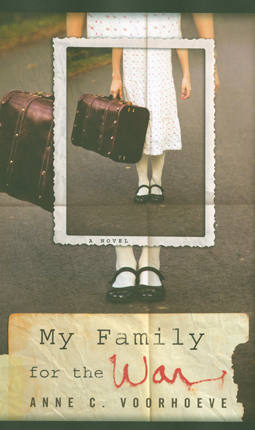Full Text Reviews: Booklist - 04/15/2012 *Starred Review* Franziska’s wealthy Berlin family has converted from Judaism to Christianity, but when the Nazis come, her parents must send her at age 11 on the Kindertransport to safety in England. During the anguished parting, her father is arrested; her mother escapes over the border to Holland; and her best friend does not make it onto the transport. When the train arrives at the English station, there is no one to meet her, but she finds a home with a kind, Orthodox Jewish family in London. “What I had learned to hate, even to hide, was a source of joy in my host’s family.” Now called Frances, she bonds closely with her loving foster mother. Will she ever see her biological mother again? Does she want to? Originally published in Germany and translated in clear, direct prose, this novel, told from a young girl’s perspective, is also a gripping history of how the war in Europe affected ordinary people. As London is bombed, Frances is temporarily evacuated to a cruel, rural family, and some of the locals hate her because she is Jewish and German. Then the news filters in about the transports and the death camps. When will the U.S. join the Allies? Will her mother survive Belsen? With the personal Kindertransport history, the intense drama about family, faith, guilt, love, and loyalty in wartime makes this an important addition to the Holocaust curriculum. - Copyright 2012 Booklist. Bulletin for the Center... - 05/01/2012 Franziska Mangold’s family may have been Protestant for the past two generations, but their Jewish heritage has made them targets for rising Nazi persecution. They use their savings to secure permits and passage to Singapore, but before they can depart, Mr. Mangold is arrested and his wife, reluctant to leave her husband, loses their one best chance to emigrate. The best she can do is apply for Ziska to leave on a kindertransport and hope that once her daughter is settled in England she will be in a position to help her parents secure work visas and join her. Ziska’s English family, the Shepards, are orthodox Jews who are surprised to learn that the child they’ve taken into their home knows nothing of her religious roots. Ridden with guilt over her own good luck in leaving Berlin (her best friend Bekka misses the last transport out) and anxiety for her parents, Ziska—now named Frances by her new “brother” Gary—isn’t the easiest little ten-year-old to warm up to. Just as the Shepards’ kindness and the comforting cycle of schooling and Jewish ritual begin to soothe her, Frances is wrenched anew by forced evacuation to the countryside during the Blitz. Mrs. Shepard obtains permission from Mrs. Mangold to bring Frances back to London, where she remains throughout the war and becomes as beloved to her temporary family as she is to biological parents. By war’s end, the possible joy of reunion is dampened by the many tragedies that have beset the Mangold family and their friends, and Frances must decide whether she will make a permanent home in England or on the continent. Voorhoeve masterfully captures the careful planning, split-second decisions, and pure dumb luck that spell the difference between life and death for those in Hitler’s crosshairs, and the intertwined stories of the Shepards and Franziska’s friends displaced by the war convey the fact that nobody survives such international cataclysm completely unscathed. A brief historical note is appended. EB - Copyright 2012 The Board of Trustees of the University of Illinois. School Library Journal - 05/01/2012 Gr 7 Up—In 1938 Berlin, 10-year-old Ziska and her best friend run from classmates-turned-bullies who torment them for being Jewish, even though Ziska's family converted in the last century and she knows nothing of the Jewish religion or culture. When her father is beaten during a brutal midnight raid on their apartment and imprisoned, Ziska earns a position on the kindertransport to England, where she begins a new life as Frances, foster daughter to an Orthodox London "family for the war." In an engaging, honest voice, she relates her fears, triumphs, and revelations as she learns English and the rituals of Judaism, adapts to a new life, and copes with guilt about her growing love for her new family. She tries in vain to acquire permits for her parents to join her while they keep up a soon spotty, strained correspondence that brings increasingly heartbreaking news of those left behind. By war's end, Frances, now 17, has experienced evacuation to the English countryside and another foster home, air raids, bomb shelters, and first love with page-turning immediacy despite the sense that the story is told by a much older, reflective Frances looking back. Events and facts are expertly woven into the girl's emotional growth, and changing relationships—especially those with her complex, fading mother and differently complex foster mother—provide a rich exploration of identity and self. Like Frances, the mostly Jewish cast of secondary characters is varied, multidimensional, and sometimes unlikable. With a compelling main character and taut and insightful story line, this novel is sure to find no shortage of readers, and it adds a valuable perspective to collections of World War II fiction.—Riva Pollard, Prospect Sierra Middle School, El Cerrito, CA - Copyright 2012 Publishers Weekly, Library Journal and/or School Library Journal used with permission. Loading...
|



